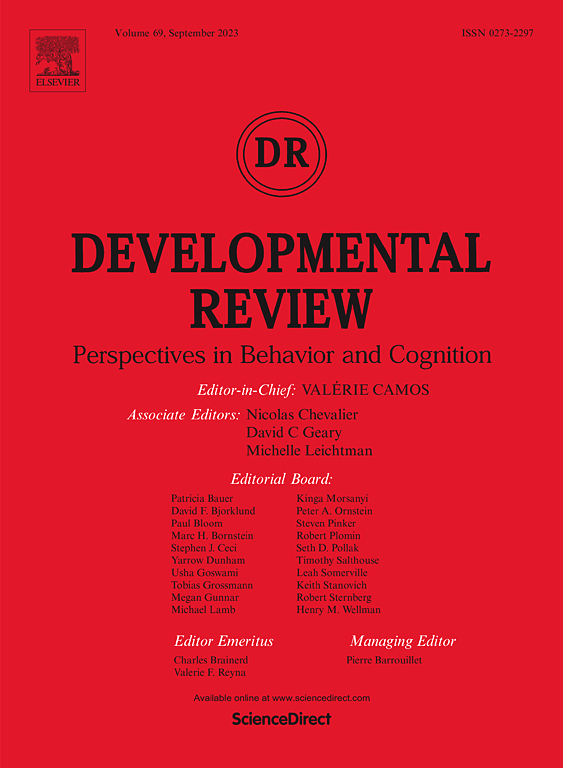特质性社交焦虑作为一种条件适应:一个发展和进化框架
IF 5.7
1区 心理学
Q1 PSYCHOLOGY, DEVELOPMENTAL
引用次数: 14
摘要
具有社交焦虑特质的个体倾向于对他人保持警惕。尽管感到社交焦虑是令人不快的,但进化心理学家认为这是一种适应。在目前的模型中,社交焦虑被描述为帮助我们的史前祖先避免社会威胁,当他们与其他群体成员的互动可能是负面的时,他们会发出警告,并激励他们采取行动防止冲突或限制冲突的损害。因此,特质社交焦虑被认为是在我们这个物种中进化而来的,因为它让我们的祖先能够维护他们的关系,并保持他们在社会等级中的地位。虽然我们同意现有进化模型得出的这一结论,但我们认为,这些解释中缺少一个重要因素:个体发展在特质社交焦虑的进化中所起的作用。我们提出了一个新的模型,认为特质社交焦虑是一种条件适应;也就是说,这种特质应该作为对幼儿环境中暗示的反应而发展,以便让个体在成年后做好面对社会威胁的准备。我们的进化模型可以为特征社交焦虑如何在我们物种中持续存在以及它在现代世界中的作用提供新的见解。本文章由计算机程序翻译,如有差异,请以英文原文为准。
Trait social anxiety as a conditional adaptation: A developmental and evolutionary framework
Individuals with trait social anxiety are disposed to be wary of others. Although feeling social anxiety is unpleasant, evolutionary psychologists consider it to be an adaptation. In current models, social anxiety is described as functioning to have helped our prehistoric ancestors avoid social threat by warning individuals when their interactions with other group members were likely to be negative and motivating them to act in ways to prevent conflict or limit its damage. Thus, trait social anxiety is thought to have evolved in our species because it allowed our ancestors to preserve their relationships and maintain their positions in social hierarchies. While we agree with this conclusion drawn by existing evolutionary models, we believe that there is an important element missing in these explanations: the role that individual development has played in the evolution of trait social anxiety. We propose a new model, which argues for trait social anxiety to be considered a conditional adaptation; that is, the trait should develop as a response to cues in the early childhood environment in order to prepare individuals to face social threat in adulthood. Our evolutionary model can provide new insights into how trait social anxiety has persisted in our species and how it functions in the modern world.
求助全文
通过发布文献求助,成功后即可免费获取论文全文。
去求助
来源期刊

Developmental Review
PSYCHOLOGY, DEVELOPMENTAL-
CiteScore
11.00
自引率
3.00%
发文量
27
审稿时长
51 days
期刊介绍:
Presenting research that bears on important conceptual issues in developmental psychology, Developmental Review: Perspectives in Behavior and Cognition provides child and developmental, child clinical, and educational psychologists with authoritative articles that reflect current thinking and cover significant scientific developments. The journal emphasizes human developmental processes and gives particular attention to issues relevant to child developmental psychology. The research concerns issues with important implications for the fields of pediatrics, psychiatry, and education, and increases the understanding of socialization processes.
 求助内容:
求助内容: 应助结果提醒方式:
应助结果提醒方式:


